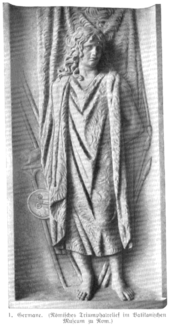Paul Herre
Paul Herre (born June 14, 1876 in Magdeburg , † October 6, 1962 in Rottenburg am Neckar ) was a German historian .
Life
Paul Herre studied modern and recent history in Berlin, Jena and Leipzig. From 1906 to 1912 he was a private lecturer at the University of Leipzig and then an associate professor until 1920.
Herre edited the 7th volume of Ullstein's world history and wrote the chapter on the general development of the state system. Together with Otto Buek , Herre tried to publish the journal Die Geisteswissenschaften . In contrast to the journal Die Naturwissenschaften, which was published by Arnold Berliner (1862–1942) in the same year and still appears today, it had to be discontinued in 1914.
From 1920 he was a councilor in the Foreign Office and from 1921 director of the Reich Archives. In 1941 he published Germany and the European Order, edited by Georg Leibbrandt and Egmont Zechlin, an homage to Adolf Hitler and the National Socialist idea of the national community. After the war, his writings were the South Tyrolean question ( Beck , Munich 1927) bears the ethnocentric-German national trains, and Germany and the European order ( German publishing house , Berlin 1941) in the Soviet occupation zone to the list of auszusondernden literature set.
In his book Kronprinz Wilhelm , published in 1954, Herre distanced himself from his own ideological past by opening the damnatio memoriae of Friedrich Wilhelm von Prussia , who died in 1951 . Like Fritz Fischer and other well-known historians of the Weimar Republic and the Third Reich, Paul Herre suddenly changed his mind after the end of the war.
Works (selection)
- The struggle for rule in the Mediterranean. The historical development of the Mediterranean. Quelle & Meyer, Leipzig 1909.
- German culture of the Middle Ages in pictures and words. Quelle & Meyer, Leipzig 1912.
- From Prussia's liberation and constitutional struggle. From the papers of Oberburggrave Magnus von Brünneck (1786–1866). ES Mittler, Berlin 1914.
- Concise political dictionary. With the editorial assistance of Kurt Jagow ed. by Paul Herre. 2 volumes. KF Koehler, Leipzig 1923, DNB 560549334 .
- Modern world history. 1890-1925. 2 volumes. Ullstein, Berlin 1925.
- The South Tyrolean question. Origin and development of a European problem of the war and post-war period. Munich 1927.
- Prince Bülow and his memorabilia. Quaderverlag, Berlin 1931.
- The secret marriage of the Hereditary Prince Wilhelm Gustav of Anhalt-Dessau and the Imperial Counts of Anhalt. Gast, Zerbst 1932.
- North Africa as an object of European colonial policy. In: The world as history. Journal for Universal History Research (WaG). Vol. 2 (1936), pp. 169-185.
- The Mediterranean as a historical scene . In: Mediterranean. Handbook for travelers by Karl Baedeker . Karl Baedeker Verlag, Leipzig 1934, pp. XXXVII-LI [37-51].
- Creative age. Historical achievements of the late age in survey and interpretation. Hase & Koehler, Leipzig 1939; 2nd, supplemented edition 1943.
- Germany and the European order. German publisher, Berlin 1941.
- Crown Prince Wilhelm. Its role in German politics. Beck, Munich 1954.
literature
- Kürschner's German Scholars Calendar . 1935
- Who is Who in the Soviet Occupied Zone? Berlin 1958
- Roger Griffin : Fascism . 1995, ISBN 0-19-289249-5
References and comments
- ^ Annual reports for German history. Edited by Albert Brackmann u. Fritz Hartung . Leipzig: Koehler. 1st year 1925 (1927). XIV, 752 pp. 299.
- ↑ It was conceived as a weekly for the entire field of philosophy, psychology, mathematics, religious studies, history, linguistics and literary studies, art studies, law and political science, social science, economics and statistics, military science, regional and ethnology, education and was released October 1, 1913 published by Veit & Comp. in Leipzig
- ↑ At the suggestion of Arthur Kronfeld , who was able to publish a comprehensive article on Freud's psychoanalytic theories of April 18, 1913, following his psychoanalysis criticism from 1912 in volume 16 of Berliner's Die Naturwissenschaften , Buek also included three reviews by Kronfeld's colleague Karl Jaspers in his journal recorded.
- ^ Hannes Obermair : Danger Zones - the English historian John Sturge Stephens (1891-1954), Italian fascism and South Tyrol . In: Richard Faber u. a. (Ed.): Italian fascism and German-speaking Catholicism . Königshausen & Neumann, Würzburg 2013, ISBN 978-3-8260-5058-9 , p. 138–162, here: p. 152 .
- ↑ http://www.polunbi.de/bibliothek/1946-nslit-h.html
Web links
- Literature by and about Paul Herre in the catalog of the German National Library
- Overview of Paul Herre's courses at the University of Leipzig (summer semester 1906 to summer semester 1914)
- Paul Herre in the professorial catalog of the University of Leipzig
- Denazification files Paul Herre as a digital reproduction in the online offer of the State Archives Sigmaringen
| personal data | |
|---|---|
| SURNAME | Lord, Paul |
| BRIEF DESCRIPTION | German historian |
| DATE OF BIRTH | June 14, 1876 |
| PLACE OF BIRTH | Magdeburg |
| DATE OF DEATH | October 6, 1962 |
| Place of death | Rottenburg am Neckar |
